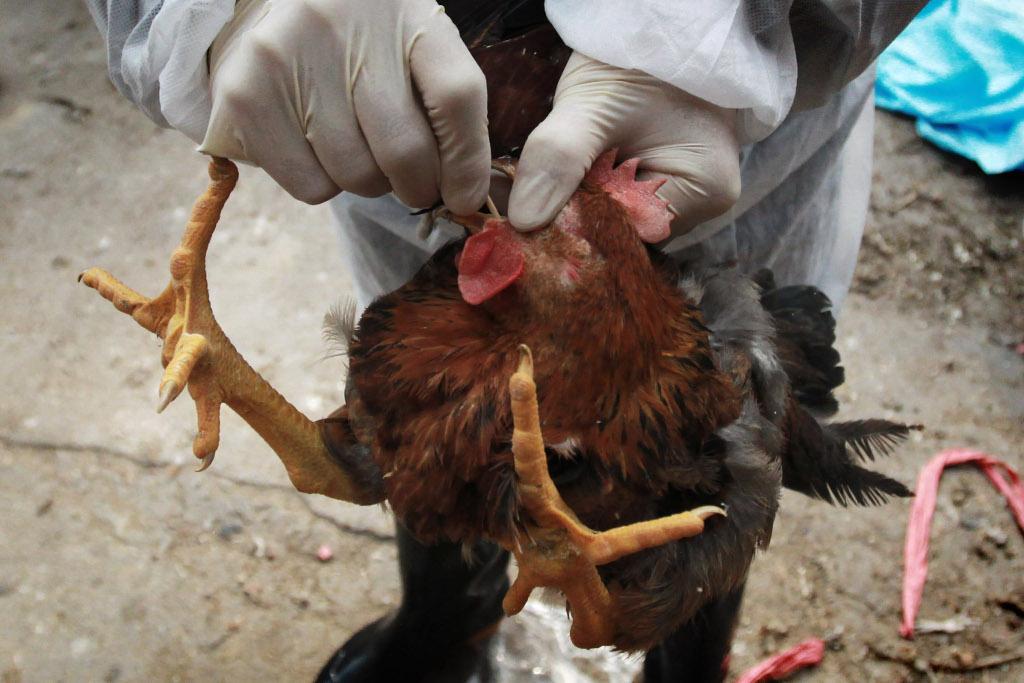As China H7N9 bird flu death toll rises, officials recommend unproven plant cure
Health workers take swab sample from a chicken at Meijiang poultry wholesale market on April 8, 2013 in Changde, China. China has confirmed 21 H7N9 bird flu cases, including six deaths, and many poultry wholesale markets have been closed in central and eastern China.
HONG KONG — The death toll from the bird flu outbreak in China rose to nine after two more people infected with the new strain died on Tuesday, government officials said.
But in their efforts to prevent the spread of bird flu, Chinese officials may have gone a step too far by advising the public to try an unproven remedy to ward off the virus's new strain.
In Jiangsu province and Shanghai, where the first human case of the H7N9 strain was discovered, government workers have suggested that ingesting woad root — a traditional Chinese medicine prescribed for the common cold — could prevent avian flu infection.
The suggestion has set off a mad dash for the herb, with many Chinese pharmacies across the country reporting shortages of the root, according to China Daily. Sales of woad (known as banlangen in Chinese) have skyrocketed tenfold in some areas, prompting fears of hoarding. Tabao, China's eBay equivalent, saw its sales surge to 1,000 packets of banlangen a day.
Shanghai's Chenshan Botanical Garden even issued a plea in the Oriental Morning Post asking citizens not to uproot their woad, as it was "for display only and shouldn't be taken away."
Many have criticized officials for making their recommendation without any evidence it works for this disease. And as Yangzhong Huang, senior fellow for global health at the Council on Foreign Affairs, pointed out, the risk is not trivial, as some traditional Chinese medicines (TCMs) "have serious side effects."
Nearly 100,000 people joined a thread debating the effectiveness of woad on Sina Weibo, China's Twitter equivalent. Some earnestly wondered whether other herbs might have the same effect; but most were skeptical.
“Even if banlangen does prove to be effective, they’ve already f*cking run out of the supply," wrote one.
The state-run Global Times newspaper tried to pour water on the craze, quoting experts who called banlangen nothing more than a "placebo" for avian flu.
Traditional Chinese medicine differs from Western medicine, and prescriptions often focus on trying to balance forces like heat, coolness, and energy flow in the body.
Banlangen is a relatively cheap TCM treatment that is viewed as being capable of cooling the blood and soothing sore throats.
Authorities previously recommended the root as a cure during the SARS epidemic of 2003.
Other problems of faulty information have also ensued.
Chinese authorities arrested at least a dozen people for spreading rumors about the disease, including that it had been found in a poultry market, the Agence-France Presse reported.
China announced on March 31 that H7N9 had been found in humans for the first time. Now, while the BBC and CNN reported 28 people in China have been infected, the AFP and Reuters put the number of confirmed cases at 31.
The World Health Organization said Monday there was no evidence that the virus could be transmitted between humans.
Shanghai has reportedly closed all live poultry markets in the city and slaughtered tens of thousands of birds in a bid to contain the deadly outbreak.
Every day, reporters and producers at The World are hard at work bringing you human-centered news from across the globe. But we can’t do it without you. We need your support to ensure we can continue this work for another year.
Make a gift today, and you’ll help us unlock a matching gift of $67,000!
